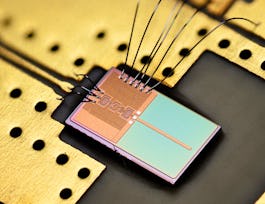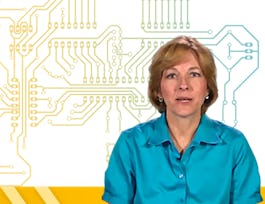This unique Master-level course offered by the Center for Wireless Technology Eindhoven (CWT/e) of the Eindhoven University of Technology, The Netherlands, provides students with in-depth knowledge and hands-on experience on RF and mmWave circuit design.



RF and millimeter-Wave Circuit Design


Instructors: Carlos Mendes, Jr.
Sponsored by Coursera Learning Team
21,699 already enrolled
(211 reviews)
Recommended experience
Skills you'll gain
- Electronic Systems
- Engineering
- Network Engineering
- General Networking
- Software Development
- Wireless Networks
- Electrical and Computer Engineering
- Equipment Design
- Computer Engineering
- Simulation and Simulation Software
- Electronic Hardware
- Electrical Engineering
- Electronic Components
- Mechanical Design
- Engineering Software
- Hardware Design
- Computer Science
- Mechanical Engineering
Details to know

Add to your LinkedIn profile
19 assignments
See how employees at top companies are mastering in-demand skills


Earn a career certificate
Add this credential to your LinkedIn profile, resume, or CV
Share it on social media and in your performance review

There are 6 modules in this course
This module will introduce the student to the RF and mm-Wave Circuit Design course and to the topic of wireless systems. It will present the learning objectives, grading system, supporting material, introductory class, and design labs. Besides, it will show the student how to use the simulation tools and the equipment used in the design labs.
What's included
7 videos6 readings1 assignment1 discussion prompt
The module on Wireless Systems will introduce the student to the history of wireless technologies, wireless system design, and RF system specifications. Concepts about transceivers will be detailed, such as path loss, interference signals, receiver sensitivity, and transmitter output power. It also includes the first design lab, the system design of a Wireless Tin Can Telephone.
What's included
6 videos6 readings4 assignments1 peer review1 discussion prompt
The Amplifiers module will introduce the student to the basic concepts of amplifiers, types of power gain, and the most used amplifier topologies. The student will also learn about low noise amplifier matching and power amplifiers classes. The second design lab will focus on designing LNAs and PAs.
What's included
9 videos6 readings4 assignments1 peer review1 discussion prompt
The Mixers module will introduce the student to the working principle of RF mixers and their basic concepts. The difference between active and passive mixers will be explained, the advantages and drawbacks of balanced and unbalanced mixers will be detailed, and the mixer's noise performance highlighted. The third design lab will cover the design of up and down-conversion mixers.
What's included
5 videos6 readings4 assignments1 peer review1 discussion prompt
The Oscillators module will introduce the student to the working principles of frequency oscillators and their basic concepts, like condition to sustain an oscillation. The student will learn about different topologies of oscillators, why and how to tune oscillators, and the impact of noise in the oscillator's signal. At last, the influence of output buffering and breakdown voltage on oscillators will also be explained. The fourth design lab will focus on designing a Voltage Controlled Oscillator (VCO).
What's included
5 videos6 readings4 assignments1 peer review1 discussion prompt
The Synthesizers module will introduce the student to the working principles of frequency synthesizers and their basic concepts. The student will learn about the importance of using synthesizers in modern wireless communications, the Phase-Locked Loop types I and II, the advantages and drawbacks of using All-Digital PLL, and the impact of the PLL frequency synthesizer on the signal's noise performance. At last, the architecture and usage of fractional-N PLL frequency synthesizers will be detailed. The fifth and last design lab will contain the design of a frequency divider and a phase detector.
What's included
4 videos5 readings2 assignments1 peer review1 discussion prompt
Instructors


Offered by
Why people choose Coursera for their career




Learner reviews
211 reviews
- 5 stars
75.82%
- 4 stars
20.85%
- 3 stars
1.89%
- 2 stars
0.47%
- 1 star
0.94%
Showing 3 of 211
Reviewed on Sep 1, 2022
an excellent course on RF circuit component designing with a profound backgroud theory and literature.
Reviewed on Apr 16, 2021
the faculties are best and the subject also very help full for me. so continue as usual.
Reviewed on Jun 7, 2021
I liked the course and was hooked to finish it, it was impossible for me to carry out the design tasks due to living in Argentina and not having access to the components easily.
Recommended if you're interested in Physical Science and Engineering

Eindhoven University of Technology

University of Illinois Urbana-Champaign

HPE Aruba Networking

Georgia Institute of Technology

Open new doors with Coursera Plus
Unlimited access to 10,000+ world-class courses, hands-on projects, and job-ready certificate programs - all included in your subscription
Advance your career with an online degree
Earn a degree from world-class universities - 100% online
Join over 3,400 global companies that choose Coursera for Business
Upskill your employees to excel in the digital economy


